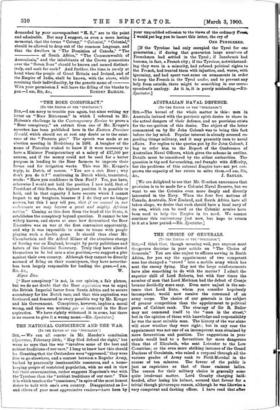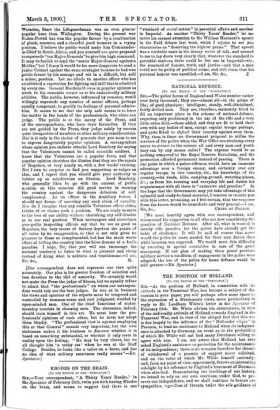THE CHOICE OF GENERALS.
[To THE EDITOR OF THE "SPECTATOR."]
SIE,—I think that, though meaning well, you express most dangerous doctrine in your acticle on "The Choice of Generals." You are also unjust to officers serving in South Africa, for you say the appointment of two competent men has changed a "crowd into a mobile army which has sent the enemy flying. May not the large reinforcements have also something to do with the matter ? I admit the superior skill of Lord Roberts, but with four times the number of men that Lord Methuen had the defeat of Cronje became decidedly more easy. Even more unjust is the sen- tence that Lord Bate, whom you consider hopelessly incompetent, would now receive the command of an army corps. The choice of our generals is the subject of greater competition than the appointment to political posts of Cabinet rank. The strategy of Sir R. Buller may not commend itself to the "man in the street," but in the opinion of those with knowledge and responsibility he was the most suitable man. The history of the war alone will show whether they were right ; but in any case the appointment was not one of an incompetent man obtained by mere favoaritism and position. The suggestions in your article would lead to a favouritism far more dangerous than that of Elisabeth, who sent Leicester to the Low Countries; or the even more striking instance of the Grand Duchess of Gerolstein, who raised a corporal through all the various grades of Army rank to Field-Marshal in the course of ten minutes. The favour of the public is just as capricious as that of those eminent ladies. The reason for their military choice is generally some quite irrelevant matter. Lord Granby charging bald- headed, after losing his ,helmet, secured that favour for a trivial though picturesque reason, although he was likewise a very competent and dashing officer. I have read that after Waterloo, Shaw the Lifeguardsman was an even greater popular hero than Wellington. During the present war Baden-Powell has won the popular favour by a combination of pluck, resource, and a cheerful good humour in a trying position. I believe the public would make him Commander- in-Chief in South Africa, and you yourself are quite prepared to supersede "ten Major-Generals" to give him high command. It may be foolish to send the "senior Major-General against a Moltke," but I fancy it would be far more dangerous to send a junior Colonel against the same strategist because he had won public favour by his courage and wit in a difficult, but still a minor, position. Let me allude to another officer who has established a reputation for fighting and skill that is admitted by every one. General Macdonald owes in popular opinion as much to his romantic career as to his undoubtedly military abilities. The public, however, influenced by romance, would willingly supersede any number of senior officers, perhaps equally competent, to gratify its feelings of personal admira- tion. It seems to me that the only safe course is to leave the matter in the hands of the professionals, who alone can judge. The public is at the mercy of the Press, and of the correspondents, who have their favourites. If they are not guided by the Press, they judge solely by success quite irrespective of numbers or other military considerations. Nor is it only in the choice of generals that you seem to me to express dangerously popular opinions. A correspondent whose opinion you endorse attacks Lord Rosebery for saying that the Volunteers cannot be called scientific soldiers. I know that the Volunteers are a popular force, and that popular opinion cherishes the illusion that they are the equals of Regulars, or very nearly so, with a few weeks' training. But I own to surprise to find you supporting so vulgar an idea, and I regret that you should give your authority to bolster up so mischievous an illusion. Lord Rosebery, who generally likes to go with the current of public opinion, on this occasion did good service in warning the country against the dangerous delusions of self- complacency. As an officer in the Auxiliary forces, I should not dream of asserting any such claim of equality. Nor do I imagine that any sensible Volunteer officer either thinks of or claims such a position. We are ready to serve to the best of our ability without cherishing any self-illusion as to our real position. When newspapers and sometimes over-polite inspecting officers say that we are as good as Regulars, the very excess of flattery deprives the praise of all value by its exaggeration, so that it not only gives no pleasure to those so complimented, but has the much worse effect of lulling the country into the false dreams of a fool's paradise. I hope, Sir, that you will not encourage the national tendency to listen to what is pleasant and cheap instead of doing what is arduous and troublesome.—I am, [Our correspondent does not represent our view quite accurately. Our plea is for greater freedom of selection and less devotion to the idol of seniority. We certainly would not make the Press the judge of fitness, but we equally refuse to admit that "the professionals" on whom our correspon- dent would rely are the best judges. In war as in business the views and opinions of the experts must be tempered and controlled by common-sense and cool judgment, wielded by open-minded men. One of the chief functions of states- manship consists in choosing men. The statesman, indeed, should train himself in this art. He must hear the pro- fessionals' opinions of each other, but he must not adopt them blindly. "The professional view is against employing this or that General" sounds very important, but the wise statesman makes it his business to discover whether it is based on something substantial, or whether it only rests in reality upon the feeling: "He may be very clever, but we all thought him 'a cocky ass' when he was at the Staff College. Besides, he looks like a tailor on a horse, and has no idea of what military smartness really means."—ED. Spectator.]







































 Previous page
Previous page